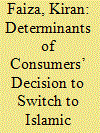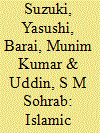|
|
|
Sort Order |
|
|
|
Items / Page
|
|
|
|
|
|
|
| Srl | Item |
| 1 |
ID:
189533


|
|
|
|
|
| Summary/Abstract |
Islamic banking is becoming a major alternative to conventional banking in many parts of the world, including the Gulf region. Although one of the prevalent reasons includes religious inclination, the variety of products added by Islamic banks contributes to customers switching from conventional to Islamic banking. This study analyses the factors responsible for customers’ decision to switch to Islamic banking in Oman through a questionnaire survey from Omani nationals in Muscat, Salalah, and Sohar. The data analysis tool included Structural Equation Modelling (SEM) analysis using SPSS and AMOS software. Some of the variables incorporated in the study include physical quality, outcome quality, interaction quality, customer satisfaction, trust, price, religion, and social prestige, which are the dependent variables. The independent variable includes the decision to switch. These variables have been incorporated to evaluate their impact on customers’ decision-making to switch from conventional to Islamic banking. The results indicate that interaction quality significantly influences the switching decision, whereas physical environment and outcome quality could not influence the decision. Moreover, customer satisfaction and trust positively affect the decision. Religion significantly influences switching decisions, while the price and social prestige have no association with it. The findings suggest that religion is a strong determinant and positively impacts switching decisions. Additionally, the people of Oman consider the quality of service, customer service, and trust before switching decisions.
|
|
|
|
|
|
|
|
|
|
|
|
|
|
|
|
| 2 |
ID:
138825


|
|
|
|
|
| Summary/Abstract |
This case study from Malaysia adds a new dimension to critiques of Islamic banking and finance (IBF) by studying various aspects of its agency and showing how its growth complements and sometimes supersedes its spiritual components, resulting in new power alignments. The first significant consequence of IBF has been its global role in an emergent multipolar financial and regulatory global space. Second, by the creation of new alliances and governing classes, it demonstrates a capacity for eschewing the encumbrances of older religious structures and institutions. IBF resonates well within the restructuring agenda of a post-neoliberal global financial order, while reshaping the meaning of religion through a post-secular worldview. Here is where the role of the new agents and authorial voices of Islamic commerce have become crucial in mediating the ethical and material tensions of IBF, acting as the free market reformers of once inflexible doctrines. Thus, the sustainability of IBF hinges upon the empowerment of this new class of secular agents. These agents of IBF find their legitimacy through the seemingly unlikely path of dereligionizing Islamic practices through commerce.
|
|
|
|
|
|
|
|
|
|
|
|
|
|
|
|
| 3 |
ID:
127079


|
|
|
|
|
| Publication |
2013.
|
| Summary/Abstract |
With diverse histories and attitudes toward risk-taking, different financial systems have a common aim: ensuring financial stability and efficiency within a geographical region. But differences exist between various financial systems as a result of their evolution and adaptation to their surrounding environment. This paper aims to analyze the incentive and sanction mechanisms of the Islamic mode of banking and the Grameen Bank model of microcredit in Bangladesh, and how they help ensure their financial stability and efficiency. We challenge the conventional explanations of their success. We point out that the informal sanction mechanisms embedded in the two modes of financial intermediation - avoiding non-compliance with Islamic Shari'ah (revealed divine law) in the case of Islamic banking, and kinship-based groupings or gushtis in the case of microcredit - play important roles in lowering the transaction costs of screening and enforcing contracts. We also point out how bank rent opportunity - the promised return from non-participatory financing and a high spread supported through low-cost funds provided by donor agencies and compulsory savings - is captured in each of the two modes, playing a further important role in maintaining their franchise values, given the specificities of the Bangladeshi financial context.
|
|
|
|
|
|
|
|
|
|
|
|
|
|
|
|
| 4 |
ID:
171860


|
|
|
|
|
| Summary/Abstract |
This study investigates the background of the pioneers of Bank Islam Malaysia Berhad (BIMB) and their perception of Islamic banking to explore the influence that their background had on the practices of BIMB, which have been criticized for being too similar to those of conventional banking. Accordingly, this study opts to explore this topic using interviews with the pioneers, complemented by archival research. Results of the research into the pioneers’ background and their perception of Islamic banking show that most came from a conventional banking background as part of the strong network of the founder of the bank, Abdul Halim Ismail. Furthermore, to fulfill the government’s expectations, they intended to make conventional banking Islamically acceptable rather than simply implementing the profit-and-loss sharing envisaged as ideal by Islamic economists, so they could provide modern banking facilities to economically underrepresented Malay Muslims. The findings reaffirm the significance of the intermediary role of practitioners, their background and philosophy in the development of products and services. In addition, the findings suggest the need for a reevaluation of the research of social scientists exploring whether Islamic banking offers an alternative to conventional global banking, as the pioneers of BIMB did not deny the value of conventional banking, but rather sought to learn from conventional banking to provide competitive banking products in a workable Islamic way.
|
|
|
|
|
|
|
|
|
|
|
|
|
|
|
|
|
|
|
|
|